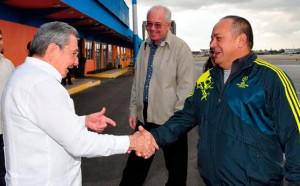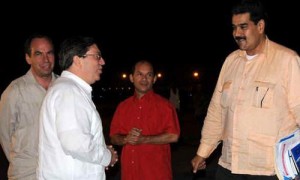In the Middle Ages, pilgrims flocked to Santiago de Compostela, in Galicia, in search of indulgences to directly enter the kingdom of heaven without going through the unpleasant experience of purgatory or limbo waiting boring (theological space, incidentally, that lately was closed). Roamed the famous Camino de Santiago (a few hundred miles if done from the French Pyrenees), gave him a hug and stick to the holy glory was assured.
Something like that is what is happening today with the dome Chavez. Pilgrims of the Bolivarian apparatus come to paradise after crossing the road from Havana to give a hug to the Castro brothers, two elderly people at this stage of life also have some consistency calcareous, or in the words of Agustín Lara, “Alabastrine” .
What do guys like Maduro, Hair and Jaua in a place like that? Obvious: they will learn the only subject on which Cuba is most skilled in the world: political survival. The Castro, who have managed to fail in all matters relating to the production of goods and services, to the amazing end of the centuries have liquidated sugar industry, have managed, however, to cling to power for 54 years, surviving very long and useless African wars Dozens of guerrilla and terrorist adventures, and the disappearance of the USSR, father, employer and financier of Cuban nonsense.
How have they achieved? This is important, because therein lies the essence of Cuban lesson to Venezuelans:
First, maintaining a discipline within the absolute power structure. There are only one head, one voice, one applause. There can be no dissent or deviation. No room for sides. The officer or director to move the crushed or removed after the public demonstration that was a scoundrel.
Second, absolute control of the machinery that makes the rules (that chorus that acts of parliament tuned) and the institution that applies as suits the rulers (the judiciary, which is only a family of executioners obsequious serving the rulers).
Third, total control, also, of the media that account for public and private events. The reality is what decides who is entrusted describe. Contradictions do not exist. One of the main functions of government is to keep secret anything that disproves the official discourse or narrative.
To achieve these objectives and induce behaviors that promote obedience, the Soviets created a very efficient public housing system.
People were placed in institutional stables, classified by age, gender and occupation, always policed ostensible policy at a distance, to feel the pressure and instil fear. (It is very important for people to not be afraid to rebel or protest).
After a couple of generations that kind of state is consolidated. Has emerged “new man”, but not exactly the creature selfless, supportive and laborious that Marx foresaw, but a type of three chains immobilized indestructible:
The force of inertia. Things are done so because they have always done it that way. There is no alternative to the discomfort that this clumsy and bureaucratic state.
Fear of repression is totally unfounded. The jail, very hard, and summary executions are effective to induce obedience. Citizens in totalitarian states believe only in flight. As stated by journalist Juan Manuel Cao, communism ended with a flood of fleeing people, not people who fought. The docility is an adaptation to the system.
Helplessness syndrome. People learn from childhood that the system is unbeatable, so it makes no sense to oppose him. Parents who want to protect their children, are the major propagators of this syndrome. They teach their children to bow their heads and obey to avoid being hurt.
What else will they learn from their teachers Chavistas Cubans? A key strategic lesson: it is time to open other fronts. Must fly the dove of peace. For the gringos were sent reassuring messages. A big capital are assured that there will be greater radicalism. A country in the neighborhood, do not be afraid postchavismo permanence. The opposition, stick and whack.
There will be time must settle these natural enemies nuts when he falls completely the Iron Curtain.
Sources: NuevoHerald/CarlosAlbertoMontaner/InternetPhotos/www.thecubanhistory.com
Cuba y Venezuela: El Camino a Santiago/ The Cuban History/ Arnoldo Varona, Editor
CUBA Y VENEZUELA: EL CAMINO A SANTIAGO
En el medievo los peregrinos acudían a Santiago de Compostela, en Galicia, en busca de indulgencias para entrar directamente en el reino de los cielos sin pasar por la desagradable experiencia del purgatorio o la aburrida espera del limbo (espacio teológico, por cierto, que últimamente fue clausurado). Recorrían el famoso Camino de Santiago (unos cuantos cientos de kilómetros si se hace desde el Pirineo francés), le daban un abrazo al santo de palo y la gloria estaba asegurada.
Algo así es lo que hoy sucede con la cúpula chavista. Los peregrinos del aparato bolivariano llegan al paraíso tras recorrer el Camino de La Habana a darles un abrazo a los hermanos Castro, dos ancianos que a estas alturas de la vida también tienen cierta consistencia calcárea, o, en palabras de Agustín Lara, “alabastrina”.
¿Qué hacen chicos como Maduro, Cabello y Jaua en un sitio como ése? Obvio: van a aprender la única materia en la que Cuba es la mayor experta del planeta: supervivencia política. Los Castro, que han conseguido fracasar en todo lo concerniente a la producción de bienes y servicios, al asombroso extremo de haber liquidado la centenaria industria azucarera, han logrado, sin embargo, aferrarse al poder durante 54 años, sobreviviendo a larguísimas e inútiles guerras africanas, decenas de aventuras guerrilleras y terroristas, y a la desaparición de la URSS, padre, patrón y financista del disparate cubano.
¿Cómo lo han logrado? Esto es importante, porque ahí radica la esencia de la lección cubana a los venezolanos:
Primero, manteniendo una absoluta disciplina dentro de la estructura de poder. Sólo existen una sola cabeza, una sola voz, un solo aplauso. No puede haber disenso ni desviación. No hay espacio para vertientes. Al funcionario o dirigente que se mueva lo aplastan o lo extirpan, previa la pública demostración de que era un canalla.
Segundo, control absoluto de la maquinaria que hace las reglas (ese coro afinado que funge de parlamento) y de la institución que las aplica como les conviene a los mandatarios (el poder judicial, que es sólo una familia de verdugos obsecuentes al servicio de los gobernantes).
Tercero, control total, también, de los medios de comunicación que dan cuenta de los hechos públicos y privados. La realidad es lo que decide quien tiene encomendado describirla. Las contradicciones no existen. Una de las principales funciones del Estado es mantener oculto cualquier aspecto que desmienta el discurso o relato oficial.
Para lograr esos objetivos e inducir los comportamientos que promueven la obediencia, los soviéticos crearon un muy eficiente sistema de estabulación ciudadana.
Las personas eran colocadas en establos institucionales, clasificándolas por la edad, el género y la ocupación, siempre vigiladas por la policía política a una distancia ostensible, para hacer sentir la presión e infundir miedo. (Es muy importante que las personas sientan temor para que no se rebelen o protesten).
Al cabo de un par de generaciones ese tipo de Estado se consolida. Ha surgido “el hombre nuevo”, pero no exactamente la criatura desinteresada, solidaria y laboriosa que preveía Marx, sino un tipo inmovilizado por tres cadenas indestructibles:
La fuerza de la inercia. Las cosas se hacen así, porque siempre se han hecho de esa manera. No hay alternativa a la incomodidad que produce ese Estado torpe y burocrático.
El miedo a la represión es totalmente fundado. La cárcel, muy dura, y las ejecuciones sumarias son eficaces para inducir la obediencia. Los ciudadanos en los Estados totalitarios sólo creen en huir. Como afirma el periodista Juan Manuel Cao, el comunismo terminó con una avalancha de gente que huía, no de gente que peleaba. La docilidad es una forma de adaptación al sistema.
El síndrome de indefensión. Las personas aprenden, desde la niñez, que el régimen es imbatible, de manera que no tiene sentido oponérsele. Los padres, que quieren proteger a sus hijos, son los grandes propagadores de ese síndrome. Ellos enseñan a sus hijos a bajar la cabeza y obedecer para que no les hagan daño.
¿Qué más van a aprender los chavistas de sus maestros cubanos? Una lección estratégica clave: no es el momento de abrir otros frentes. Debe volar la paloma de la paz. A los gringos se les mandan mensajes tranquilizadores. A los grandes capitales se les asegura que no habrá mayores radicalismos. A los países del vecindario, que no deben temer la permanencia del postchavismo. A la oposición, palo y tentetieso.
Ya habrá tiempo de ajustarles las tuercas a esos enemigos naturales cuando caiga totalmente el telón de acero.
Sources: NuevoHerald/CarlosAlbertoMontaner/InternetPhotos/www.thecubanhistory.com
Cuba y Venezuela: El Camino a Santiago/ The Cuban History/ Arnoldo Varona, Editor



 Cuba and Venezuela: The Road to Santiago * * Cuba y Venezuela: El Camino a Santiago.
Cuba and Venezuela: The Road to Santiago * * Cuba y Venezuela: El Camino a Santiago.

